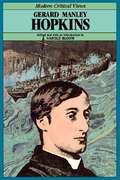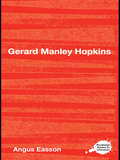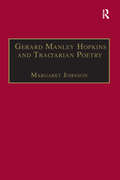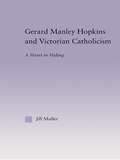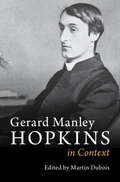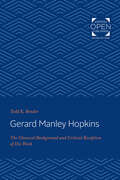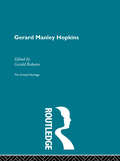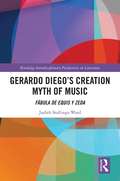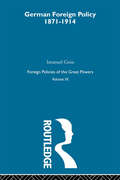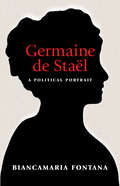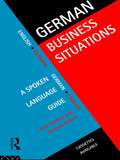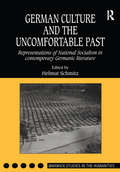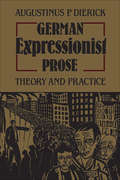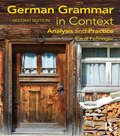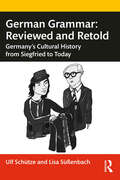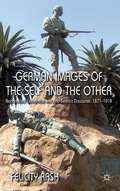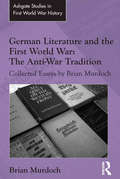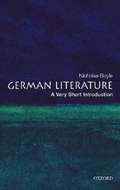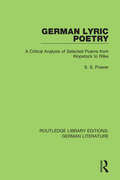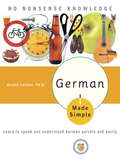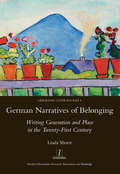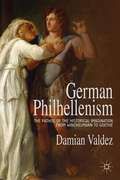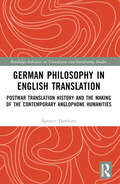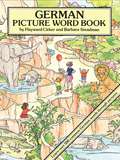- Table View
- List View
Gerard Manley Hopkins (Modern Critical Views)
by Harold BloomThe poetry is viewed in reference to his culture and surroundings, as well as within the context of his own life experience.
Gerard Manley Hopkins (Routledge Guides to Literature)
by Angus EassonGerard Manley Hopkins was among the most innovative writers of the Victorian period. Experimental and idiosyncratic, his work remains important for any student of nineteenth-century literature and culture. This guide to Hopkins’ life and work offers: a detailed account of Hopkins life and creative development an extensive introduction to Hopkins’ poems, their critical history and the many interpretations of his work cross-references between documents and sections of the guide, in order to suggest links between texts, contexts and criticism suggestions for further reading. Part of the Routledge Guides to Literature series, this volume is essential reading for all those beginning detailed study of Hopkins’ work and seeking not only a guide to the poems, but a way through the wealth of contextual and critical material that surrounds them.
Gerard Manley Hopkins and Tractarian Poetry (The Nineteenth Century Series)
by Margaret JohnsonGerard Manley Hopkins and Tractarian Poetry for the first time locates Hopkins and his work within the vital aesthetic and religious cultures of his youth. It introduces some of the most powerful cultural influences on his poetry as well as some of the most influential poets, from the well-known fellow convert John Henry Newman to the almost forgotten historian and poet Richard Dixon. From within the context of Hopkins' developing catholic sensibilities it assesses the impact of and his responses to issues of the time which related to his own religious and aesthetic perceptions, and provides a rich and intricate background against which to view both his early, often neglected poetry and the justly famous, idiosyncratic and deeply moving verse of his mature years. By detailing the influences Tractarian poetry had upon Hopkins' early work, and applying these to the productions of his later years, Gerard Manley Hopkins and Tractarian Poetry demonstrates how Hopkins' best known, mature works evolved from his upbringing in the Church of England and remained always indebted to this early culture. It offers readings of his works in light of a new appraisal of the contexts from which Hopkins himself grew, providing a fresh approach to this most challenging and rewarding of poets.
Gerard Manley Hopkins and Victorian Catholicism: A Heart in Hiding (Studies in Major Literary Authors #Vol. 27)
by Jill MullerThis book restores the poet to his full intellectual and literary context as a Victorian convert to Catholicism.
Gerard Manley Hopkins in Context (Literature in Context)
by Martin DuboisGerard Manley Hopkins was one of the most innovative British poets of the nineteenth century. This book provides an authoritative guide to the ideas and influences shaping Hopkins's life and writing. Consisting of thirty-eight essays by leading scholars, the book covers topics that have long attracted scholarly attention while also responding to recent critical trends. It considers Hopkins's formal innovations alongside his theological and philosophical ideas. Chapters examine his Victorian aesthetic and cultural contexts as well as the significance of his ecological imagination and response to environmental degradation. Hopkins's poetry was not widely known until the 1930s, and the book closes by discussing the distinctive nature of its reception and influence. Informed by original research but accessibly written, the essays enable a fresh engagement with the originality of Hopkins's writing and thought.
Gerard Manley Hopkins: The Classical Background and Critical Reception of His Work
by Todd K. BenderOriginally published in 1966. In his lifetime, Gerard Manley Hopkins was known as a poet only by a small circle of his friends. More than any other major Victorian writer, he was recovered and presented as a poet to modern readers by editors and scholars of the first half of the twentieth century. This book analyzes how and to what extent the presuppositions of these critics have dictated the modern conception of Hopkins's work. Bender seeks to dispel, once and for all, the notion that Hopkins was a naïf poet. He provides an analysis of classical Greek and Latin rhetoric relative to the classical background of Hopkins's style and the structure in his poetry. He maintains that especially in Hopkins's more extreme work, such as "The Wreck of the Deutschland," there are precedents for the structure of the poem itself, the structure of the sentences within the poem, and its sensual and obscure imagery in the classical literature that Hopkins knew so well.Bender's study suggests two highly controversial positons: first, that although Hopkins is one of the most original voices in English, his poetry is within a tradition insufficiently recognized by modern critics; and second, that the effect of careful and sympathetic study of classical literature can induce quite the opposite of a neoclassical style in English.
Gerard Manley Hopkins: The Critical Heritage (Critical Heritage Ser.)
by Gerald RobertsThe Critical Heritage gathers together a large body of critical sources on major figures in literature. Each volume presents contemporary responses to a writer's work, enabling students and researchers to read for themselves, for example, comments on early performances of Shakespeare's plays, or reactions to the first publication of Jane Austen's novels. The carefully selected sources range from landmark essays in the history of criticism to journalism and contemporary opinion, and little published documentary material such as letters and diaries. Significant pieces of criticism from later periods are also included, in order to demonstrate the fluctuations in an author's reputation. Each volume contains an introduction to the writer's published works, a selected bibliography, and an index of works, authors and subjects. The Collected Critical Heritage set will be available as a set of 68 volumes and the series will also be available in mini sets selected by period (in slipcase boxes) and as individual volumes.
Gerardo Diego’s Creation Myth of Music: Fábula de Equis y Zeda (Routledge Interdisciplinary Perspectives on Literature)
by Judith Stallings-WardSince its publication nearly eight decades ago, the consensus among scholars about Fábula de Equis y Zeda, by the Spanish poet Gerardo Diego (1896-1987) remains unchanged: Fábula is an enigmatic avant-garde curiosity. It seems to rob the reader of the reason necessary to interpret it, even as it lures him or her ineluctably to the task; nevertheless, the present study makes the case that this work is, in fact, not inaccessible, and that what the anhelante arquitecto, intended with his masterpiece was a creation myth that explains the evolution of music in his day. This monograph unlocks the fullness of the poem´s meaning sourced in music’s mythical consciousness and expressed in a poetic idiom that replicates aesthetic concepts and cubist strategies of form embraced by the neoclassical composers Bartok, Falla, Ravel, and Stravinsky.
Germ Foreign Pol 1871-1914 V9
by GeissFirst Published in 2001. Routledge is an imprint of Taylor & Francis, an informa company.
Germaine de Stael: A Political Portrait
by Biancamaria FontanaGermaine de Staël (1766-1817) is perhaps best known today as a novelist, literary critic, and outspoken and independent thinker. Yet she was also a prominent figure in politics during the French Revolution. Biancamaria Fontana sheds new light on this often overlooked aspect of Staël's life and work, bringing vividly to life her unique experience as a political actor in a world where women had no place.The banker's daughter who became one of Europe's best-connected intellectuals, Staël was an exceptionally talented woman who achieved a degree of public influence to which not even her wealth and privilege would normally have entitled her. During the Revolution, when the lives of so many around her were destroyed, she succeeded in carving out a unique path for herself and making her views heard, first by the powerful men around her, later by the European public at large. Fontana provides the first in-depth look at her substantial output of writings on the theory and practice of the exercise of power, setting in sharp relief the dimension of Staël's life that she cared most about--politics. She was fascinated by the nature of public opinion, and believed that viable political regimes were founded on public trust and popular consensus. Fontana shows how Staël's ideas were shaped by the remarkable times in which she lived, and argues that it is only through a consideration of her political insights that we can fully understand Staël's legacy and its enduring relevance for us today.
German Business Situations
by Paul Hartley Gertrud RobinsGerman Business Situations is a handy reference and learning text for all who use or need spoken German for business. Over 40 situations are simply presented, including * basic phone calls * leaving messages * making presentations * comparing, enquiring, booking selling techniques With full English translations and usage note, German Business Situations will help you to communicate confidently and effectively in a broad range of everyday business situations
German Culture and the Uncomfortable Past: Representations of National Socialism in Contemporary Germanic Literature (Warwick Studies in the Humanities)
by Helmut SchmitzBeginning with the question of the role of the past in the shaping of a contemporary identity, this volumes spans three generations of German and Austrian writers and explores changes and shifts in the aesthetics of Vergangenheitsbewältigung (coming to terms with the past). The purpose of the book is to assess contemporary German literary representations of National Socialism in a wider context of these current debates. The contributors address questions arising from a shift over the last decade, triggered by a generation change-questions of personal and national identity in Germany and Austria, and the aesthetics of memory. One of the central questions that emerges in relation to the Hitler youth generation is that of biography, as examined through Günter Grass' and Martin Walser's conflicting views on the subject of National Socialism. Other themes explored here are the conflict between the post-war generations and the contributions of that conflict to (West)-German mentality, and the growing historical distance and its influence on the aesthetics of representation.
German Expressionist Prose: Theory and Practice
by Augustinus DierickAn extreme sensitivity to gathering social crisis, an accompanying angry enthusiasm for artistic experimentation and renewal – this compelling mix in German art, poetry, and drama of the period 1910 to 1925 continues to draw both scholarly attention and intense popular interest. In this book Augustinus Dierick focuses on another significant but hitherto neglected medium of German Expressionist thought – short narrative prose – in order to illuminate and evaluate the contribution of that genre to one of the twentieth century's most powerful artistic movements. Dierick's study includes a thorough analysis of the works of a broad range of Expressionist prose writers, from those of such specialists in the genre as Edschmid, Heym, Benn, Loerke, Frank, Sternheim, Ehrenstein, and 'Mynona' to the shorter prose works of such major figures as Alfred Döblin, Heinrich Mann, Max Brod, and Franz Werfel. Dierick isolates the thematic obsessions common among Expressionist writers: the pathos of the self in confrontation with nature and with God, the tension between self and the institutions of bourgeois society, and the attractions and dangers of eroticism. Throughout Dierick stresses the interrelationship between themes and their formal expression. He examines many apparent excesses in style and tone, many aberrations in structure and generic characteristics, and identifies them not as needless experimentation but as a necessary result of the attempt to find appropriate forms for extreme situations and complex ideas. Dierick's analysis makes clear that Expressionist prose has an intrinsic artistic value and, because of certain nuances and different accents, must be included in any estimation of the nature and importance of Expressionism as a whole.
German Grammar in Context (Languages in Context)
by Carol FehringerGerman Grammar in Context, 3rd Edition includes updated textual examples which provide the basis for an accessible and engaging approach to learning grammar. Using authentic texts from a variety of contemporary sources such as newspapers, magazines, poems, TV and film scripts, books or online sources, each chapter explores a key aspect of German grammar. Following each text, exercises are provided to reinforce understanding and build effective comprehension and communication skills. Helpful keyword boxes translate difficult vocabulary in the texts, and recommended reading sections offer advice on additional grammar resources and website links. German Grammar in Context is an essential resource for students at CEFR level B1–C2 and Intermediate–Advanced High on the ACTFL scale. It is suitable for both classroom use and independent study.
German Grammar in Context, Second Edition
by Carol FehringerGerman Grammar in Context presents an accessible and engaging approach to learning grammar. Each chapter opens with a real-life extract from a German newspaper, magazine, poem, book or internet source and uses this text as the starting point for explaining a particular key area of German grammar. A range of exercises follow at the end of the chapter, helping students to reinforce and test their understanding, and an answer key is also provided at the back of the book. This second edition features: Updated texts with current newspaper and magazine articles and new extracts from digital media such as chatrooms or blogs Inclusion of a wide-ranging selection of sources and topics to further students’ engagement with issues relevant to contemporary Germany and Austria Clear and user-friendly coverage of grammar, aided by a list of grammatical terms A wide variety of inventive exercises designed to thoroughly build up grammatical understanding, vocabulary acquisition and effective comprehension and communication skills Helpful 'keyword boxes' translating difficult vocabulary in the texts A recommended reading section offering advice on additional grammar resources and website links German Grammar in Context will be an essential resource for intermediate to advanced students of German. It is suitable for both classroom use and independent study. ?
German Grammar: Germany’s Cultural History from Siegfried to Today
by Ulf Schütze Lisa SüßenbachGerman Grammar: Reviewed and Retold is a user-friendly grammar/workbook designed to give German learners a great basis to build an in-depth knowledge of spoken and written German. Bridging the gap between grammar, storytelling, and culture, learners of the German language discover Germany’s cultural history as well as life in Germany today, while absorbing grammatical structures through reading and practice. This grammar is based on recent Second Language Acquisition (SLA) research and word frequency, to embed vocabulary and grammar into a language-specific cultural context. A key component of this approach is consistency and relevance, enabling students to apply grammatical structures to their language learning, as well as talking about the past, present, and future. Aimed at ACTFL levels Novice (all) to Intermediate (middle)/CEFR A1 to B1, this is the perfect grammar for post-beginners, combining storytelling with grammar acquisition.
German Images of the Self and the Other
by Felicity RashThis book provides a detailed linguistic analysis of the nationalist discourses of the German Second Reich, which most effectively demonstrate the contrasting images of the German Self and its various Others, such as Jews, native Africans, gypsies and the enemy Other during the First World War.
German Literature and the First World War: Collected Essays by Brian Murdoch (Routledge Studies in First World War History)
by Brian MurdochThe period immediately following the end of the First World War witnessed an outpouring of artistic and literary creativity, as those that had lived through the war years sought to communicate their experiences and opinions. In Germany this manifested itself broadly into two camps, one condemning the war outright; the other condemning the defeat. Of the former, Erich Maria Remarque’s All Quiet on the Western Front remains the archetypal example of an anti-war novel, and one that has become synonymous with the Great War. Yet the tremendous and enduring popularity of Remarque’s work has to some extent eclipsed a plethora of other German anti-war writers, such as Hans Chlumberg, Ernst Johannsen and Adrienne Thomas. In order to provide a more rounded view of German anti-war literature, this volume offers a selection of essays published by Brian Murdoch over the past twenty years. Beginning with a newly written introduction, providing the context for the volume and surveying recent developments in the subject, the essays that follow range broadly over the German anti-war literary tradition, telling us much about the shifting and contested nature of the war. The volume also touches upon subjects such as responsibility, victimhood, the problem of historical hiatus in the production and reception of novels, drama, poetry, film and other literature written during the war, in the Weimar Republic, and in the Third Reich. The collection also underlines the potential dangers of using novels as historical sources even when they look like diaries. One essay was previously unpublished, two have been augmented, and three are translated into English for the first time. Taken together they offer a fascinating insight into the cultural memory and literary legacy of the First World War and German anti-war texts.
German Literature: A Very Short Introduction
by Nicholas BoyleGerman literature in all genres and from all historical periods has exerted an enormous influence on the history of western thought. From Martin Luther, Frederick Schiller, and Johann Wolfgang von Goethe to Karl Marx, Sigmund Freud, Thomas Mann, Bertolt Brecht, and Gunter Grass, Germany has produced an impressive number of great writers and great works. In German Literature: A Very Short Introduction, Nicholas Boyle illuminates the particular character and power of German literature and explores its impact on the larger cultural world. Boyle presents an engrossing tour of German literature from the Middle Ages to the 20th century, focusing especially on the last 250 years. He examines key themes like idealism, modernism, materialism, trauma and memory, showing how they have imbued the great German writers with such distinctive voices. Indeed, this brief introduction offers broad coverage of German literature, revealing the links between German literature and the German nation, examining the literary and philosophical responses of German writers to social, political, and economic change, and seeking out the connections between Germany's intellectual traditions and its often violent and tragic history.
German Lyric Poetry: A Critical Analysis of Selected Poems from Klopstock to Rilke
by S. S. PrawerOriginally published in 1952, this book provides a detailed critical analysis of 40 German lyrics. All the poems analysed are reprinted in full, so that criticism may be checked by reference to the original text. The book therefore provides a unique introduction to German poetry from the Age of Enlightenment to that of Rilke, without burdening the reader with too much details about minor figures.
German Made Simple: Learn to speak and understand German quickly and easily (Made Simple)
by Arnold LeitnerLearning German Has Never Been Easier! Whether you are studying the language in school, planning a trip to Germany or Austria, or trying to learn the basics of the language closest to English, German Made Simple is the perfect book for any self-learner. Void of all nonessentials and refreshingly easy to understand, German Made Simple includes:• Basics of German grammar• Modern German vocabulary• German pronunciation guide• German reading exercises• German economic information• Common German expressions• Review exercises• Complete answer key• German-English dictionary
German Narratives of Belonging: Writing Generation and Place in the Twenty-First Century
by Linda ShorttSince unification, German culture has experienced a boom in discourses on generation, family and place. Linda Shortt reads this as symptomatic of a wider quest for belonging that mobilises attachment to counter the effects of post-modern deterritorialisation and globalisation. Investigating twenty-first century narratives of belonging by Reinhard Jirgl, Christoph Hein, Angelika Overath, Florian Illies, Juli Zeh, Stephan Wackwitz, Uwe Timm and Peter Schneider, Shortt examines how the desire to belong is repeatedly unsettled by disturbances of lineage and tradition. In this way, she combines an analysis of supermodernity with an enquiry into German memory contests on the National Socialist era, 1968 and 1989 that continue to shape identity in the Berlin Republic. Exploring a spectrum of narratives that range from agitated disavowals of place to romances of belonging, this study illuminates the topography of belonging in contemporary Germany.
German Philhellenism
by Damian ValdezPhilhellenism the fascination with the art, politics, religion and society of ancient Greece- is a powerful and compelling phenomenon in German culture and intellectual history, creating a language and a series of key ideas that were to exert a continuous influence on German thought, aesthetics and politics well into the twentieth century. In this book Valdez examines the first generation of German Philhellenes from Winckelmann to Goethe. He shows how German Philhellenism was torn between the search for a historical whole which could explain and encompass Greek excellence, and the desire to incorporate individual aspects of Greece in a wider ethical and artistic enterprise, and finally, to give it a place in the history of freedom itself. Valdez also shows that German philhellenic ideas grew out of a dialogue with French and British ideas and historiography. He charts how the fascination with Greek antiquity was reflected in theatre and literature and how the longings and idealisation of Philhellenes clashed with the more critical and sober historians of the Enlightenment. The book also explains how the search for the historical reality of philhellenic ideals created intense emotional and ideological conflicts about the unique nature of male friendship in ancient Greece and about the position of women in ancient Athens.
German Philosophy in English Translation: Postwar Translation History and the Making of the Contemporary Anglophone Humanities (Routledge Advances in Translation and Interpreting Studies)
by Spencer HawkinsThis book traces the translation history of twentieth-century German philosophy into English, with significant layovers in Paris, and proposes an innovative approach to long-standing difficulties in its translation. German philosophy’s reputation for profundity is often understood to lie in German’s polysemous vocabulary, which is notoriously difficult to translate even into its close relative, English. Hawkins shows the merit in a strategy of “differential translation,” which involves translating conceptually dense German terms with multiple different terms in the target text, rather than the conventional standard of selecting one term in English for consistent translation. German Philosophy in English Translation explores how debates around this strategy have polarized both the French-language and English-language translation landscapes. Well-known translators and commissioners such as Jean Beaufret, Adam Phillips, and Joan Stambaugh come out boldly in favor, and others such as Jean Laplanche and Terry Pinkard polemically against it. Drawing on Hans Blumenberg’s work on metaphor, German Philosophy in English Translation questions prevalent norms around the translation of terminology that obscure the metaphoric dimension of German philosophical vocabulary. This book is a crucial reference for translators and researchers interested in the German language, and particularly for scholars in translation studies, philosophy, and intellectual history.
German Picture Word Book
by Barbara Steadman Hayward CirkerHere's a pleasant and effective way for students of German to build and strengthen vocabulary skills. The book consists of 15 carefully rendered scenes -- 14 double-page and one single-page -- each devoted to a different theme of topic: Im Zoo (At the Zoo); Das Wohnzimmer (Living Room); Auf dern Bauernhof (On the Farm); Das Badezimmer (Bathroom); Das Schlafzimmer des Mädchens (Girl's Bedroom); Beim Abendessen (At Dinner); Das Schlafzimmer des Jungens (Boy's Bedroom); Der Supermarkt (Supermarket); Das Klassenzimmer (Classroom); Am Strand (At the Beach); and 5 more.Each illustration contains dozens of common objects, clearly labeled in German. By studying the illustrations, students can learn over 500 words for common household items, clothing, foods, vehicles, furniture, names of animals, parts of the body, types of stores and public buildings, and many more.To help reinforce words and meanings, all the scenes in this book are ideal for coloring. In addition, a complete list of German words (with definite articles) and English translations will be found at the back of the book. The result is an attractive and useful language resource that will appeal to any student of basic German, child or adult.
